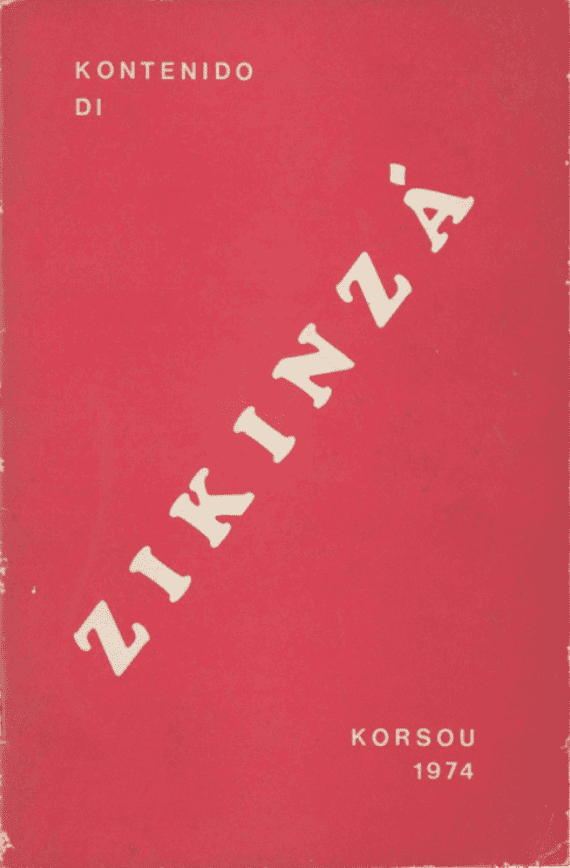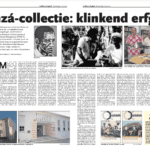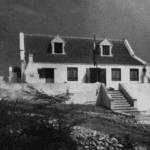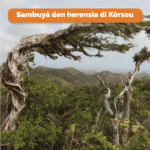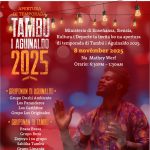Durante di seis aña, for di aña 1958, Paul (Pader) Brenneker i Elis Juliana a kolektá un gran kantidat di historianan oral, kantikanan i músika serka e hende grandinan di Kòrsou. Asina nan a mapa partinan importante kultural di e bida diario di Kòrsou di antes. Nan informante más grandi a nase na 1853, dies aña promé ku abolishon di sklabitud. E informashón kolektá a bira kolekshon Zikinzá. E kolekshon ta konsistí di 1400 kantikanan, historianan i historianan di bida. Anèkdotanan, rekuerdonan di antes, ritualnan i kantikanan di pueblo di 267 informantenan ta grabá. E meta di Brenneker i Juliana tabata pa konservá konosementu i sabiduria di e hendenan grandi i rural di pueblo, ku ahinda no tabata den kontakto ku e modèrnisashon di suidat.
Na aña 1974 nan a transferensha e herensia kultural antropológiko aki pa Fundashon Zikinzá. For di 2010 e kolekshon Zikinzá ta bou di manejo di NAAM (National Archeological Anthropological Memory Management).
During six years, from 1958 on, Father Brenneker and Elis Juliana collected a big amount of oral history, songs, pieces and music from the elderly people of Curaçao. This is how they could map important cultural aspects of everyday life in Curaçao. Their oldest informant was born in 1853, ten years before the abolition of slavery. The collected information is stored in the Zikinzá collection. The collection contains 1400 songs, stories and life stories. Anecdotes, childhood memories, riltuals and folklore songs of 267 informants were recorded. The goal of Brenneker and Juliana was to record knowledge and wisdom of the elderly, rural population, that was still isolated from the modernisation happening in the more urbanised areas. In 1974 this cultural anthropological heritage was transferred to the Zikinzá Foundation. From 2010 on the Zikinzá collection is under management of NAAM (National Archeological Anthropological Memory Management).
Zes jaar lang, vanaf 1958, hebben Paul Brenneker en Elis Juliana een grote hoeveelheid mondelinge geschiedenis, liederen en muziek verzameld bij de ouderen van Curaçao. Op deze manier hebben zij belangrijke culturele aspecten van het dagelijks leven van Curaçao in kaart gebracht. Hun oudste informant werd geboren omstreeks 1853, tien jaar voor de afschaffing van de slavernij. De meeste van de door Juliana en Brenneker verzamelde informatie is opgeslagen in de Zikinzá-collectie, een databank bestaande uit 1.400 liederen, verhalen, en levensverhalen. Anekdotes, jeugdherinneringen, rituelen en volksliedjes werden bij 267 informanten op band opgenomen. Inhoudelijk ging het Brenneker en Juliana om het vastleggen van de kennis en de wijsheid van de oudere, rurale bevolking, die nog geïsoleerd leefden van de stad en de oprukkende modernisering in de stad. In 1974 werd dit cultureel antropologische erfgoed overgedragen aan Stichting Zikinzá. In 2010 is de Zikinzá collectie bij NAAM (Nationaal Archeologisch, Antropologisch Memory Management) in beheer gebracht.


![SMC002-FD-LOGO-500px-[ANI]](https://dutchcaribbeanheritage.wp.kukiko.com/wp-content/uploads/sites/7/2024/04/SMC002-FD-LOGO-500px-ANI.gif)
